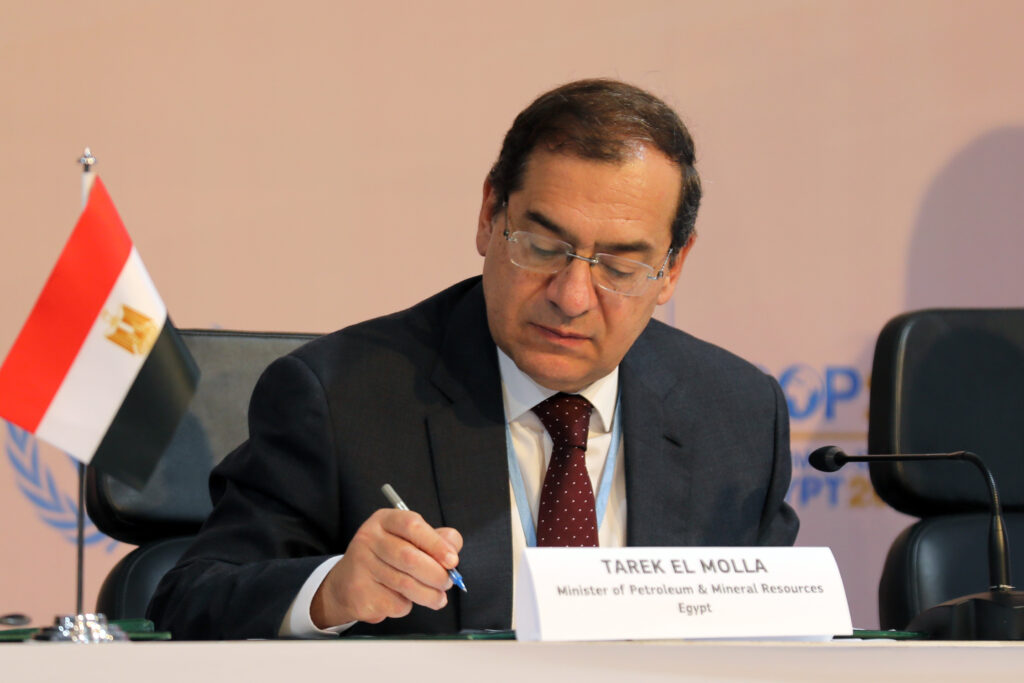Egypt’s petroleum and mineral resources minister, Tarek El Molla, has said that his country will set out its national low-carbon energy strategy in the coming weeks to adapt to technology advances and global geopolitical circumstances.
“Time evolves and technology advances and with the challenges that happened over the last few years, especially after the Russia-Ukraine war… we have started to update our energy strategy”, he said, at a British-Egyptian Business Association event in his honour on Monday evening in Cairo.
The ministry last presented its Integrated Sustainable Energy Strategy 2035 with the ministry of electricity and renewable energy in 2016.
At the UN climate conference Cop27 in November, host country Egypt brought forward its goal of sourcing 42% of its energy from renewable sources by 2035 to 2030. Its current renewable energy component is about 20%
However, as the country suffers from the economic fallout of the Russia-Ukraine war, it is also looking for ways to solve its foreign currency crunch and maximise its natural gas exports.
Egypt has increased natural gas exports to Europe during its energy crisis, as supplies from Russia were cut by more than 80% last year and prices surged.
Mr. El Molla said at the Egypt Petroleum Show in Cairo last month that the state is planning to offer three international gas and oil tenders this year and has an “ambitious plan” to drill more than 300 exploration wells by 2025.
The war “unveiled the reality that the world is not ready today for renewables” to take over, Mr. El Molla said on Monday. “The gap showed that you need to diversify with another source of supply for some time.”
Decarbonisation and a transition to low carbon energy sources, including natural gas, will be core elements of Egypt’s oil and gas sector strategy, Mr El Molla said.
Energy subsidy reform, energy efficiency, renewable energy and hydrogen are additional key pillars of the plan.
“We need to go away from subsidies. More subsidies means more consumption, means cheaper treatment of products, means more emissions, means more and more pollution,” Mr. El Molla said. “If you put the right price for the right fuel, it reflects on the consumption.”
He emphasized that targeted social safety nets, such as Takaful and Karama, would continue to cushion vulnerable groups.
Egypt raised domestic gasoline prices by between 7 to 10% earlier this month to bring them more in line with global levels.
It is a delicate balancing act as its population of 104 million — of which about 30 million live below the poverty line — faces record inflation and a weakening currency.
Key pillars of Egypt’s new energy strategy will include energy subsidy reform, decarbonized natural gas to complement renewable energy and hydrogen.
The government has been seeking to decrease the consumption of petroleum products in favour of decarbonized natural gas in recent years.
Egypt has been a net exporter of natural gas since 2019 and has been securing additional gas through regional co-operation with countries such as Israel and Cyprus.
In 1999-2000, out of 37 million tonnes of consumption annually, natural gas made up of 38% and petroleum products 62%, according to Mr. El Molla.
By 2014-15, out of 73 million tonnes of consumption, the split was more even with natural gas making up 48% and petroleum products 52%
In 2022-23, annual consumption is at 82 million tonnes with natural gas making up 65% and petroleum products 35%.
Fourteen million households now have natural gas connections, saving 845,000 tonnes of carbon emissions annually.
Half a million vehicles are running on compressed natural gas, saving 2.2 million tonnes of carbon emissions per year.
Energy efficiency and green projects.
Energy efficiency projects over the last five years, with the technical support of the European Union, have resulted in annual energy savings of $130 million, Mr El Molla said.
The government has several planned green petrochemical projects that require total investments of $2 billion and would result in a carbon emissions reduction of 3.3 million tonnes annually.
Egypt has also endorsed the World Bank initiative for zero routine flaring by 2030 and the Global Methane Pledge launched at Cop26, which aims to reduce global methane emissions by at least 30% from 2020 levels by 2030.
The Suez Canal Economic Zone signed a potential $83 billion worth of green hydrogen deals at Cop27.
The petroleum ministry is part of a national committee headed by the Prime Minister that is entrusted with preparing the country’s national low-carbon hydrogen strategy. This will include preparing an incentives package to promote investments into green hydrogen projects.
Oil and gas ‘part of the solution’
Despite some criticism that the number of delegates with links to fossil fuels at Cop27 jumped 25% from Cop26, Mr El Molla said their participation “showed the world that the oil and gas sector can be a part of the solution”.
Campaign group Global Witness found more than 600 representatives from the coal, oil and gas industries out of about 50,000 people attended the Sharm El Sheikh conference, up from 503 delegates in Glasgow.
Globally, the tone of seeing oil and gas companies as the “bad guys” has shifted, Mr El Molla said, and there is a recognition that engagement and alignment will ensure a smoother transition.
“Our industry will always be needed for decades to come, but we also need to be more responsible and we need to be part of the community,” he said.
The British Egyptian Business Association, established in 1996, is a non-profit organization serving the interests of the British and Egyptian business community.

